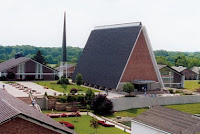 |
| H. C. Schwan |
This continues from
Part 18 (Table of Contents in
Part 3), a series presenting an English translation of Pastor Christian Hochstetter's 1885 496-page book entitled (abbreviated)
The History of the Missouri Synod, 1838-1884. It concludes the text of the book — One might wonder that the effects of the Predestinarian Controversy would have been dispensed with by now, but instead we are treated to a magnificent address by President H. C. Schwan on the blessed victory in the Truth won by the Missouri Synod. Anyone who still finds themselves a little confused over the doctrine of the Election of Grace, or Predestination, (like me) would do well to read Schwan's address for a plainly worded explanation of it, and why the Missouri Synod had to be right. It had to do with the "general promises of grace in the Gospel". This address shows why his famous "Schwan's Catechism" became so popular in the Old Missouri Synod. — Following this, our author Hochstetter then spoke for the whole Old Missouri Synod as he surveys the history to his time. He begins with the statement that it was "a story full of church battles". This echoes Walther's statement from his sickbed to Pieper that "the dispute was hard, very hard. We have experienced a lot of opposition. But I could not help it. When the Lord Christ asks me on the Last Day why I taught thus, I will answer: Thou, O Christ, with your clear Word hath taught me and seduced me.” The battles were not Walther's or the Missouri Synod's battles, they were the battles of the Lord, fought with "the sword of the Spirit, which is the word of God" (Eph. 6:17).
Some quotes from Chapter 13c: (458-480)
461: Schwan's address: "For only those to whom the Lord grants victory are victors."
463: "For the more… the dear simple-minded people are concerned about the general promises of grace of the Gospel, the easier it is to persuade them that only from these passages can the doctrine of God's eternal election be taken or explained."
464: "No, if we sincerely believe that it is the Lord… then our joy must be… the joy in the Lord."
466: Hochstetter's Review: "Are we to watch idly when the Pope, as the real Antichrist, fights against Christ with his servants?"
467: "Those err grievously who think that it is best for the church to live quite peacefully, without struggle."
470: "…convinced that Luther was… the angel with the eternal Gospel… to fly through the midst of heaven"
470: "…while we do not… accept such open questions as the Iowans prefer"
471: "but we accept the Lutheran Confessions without reserve, because… thoroughly Scriptural confession"
473: Luther: "Contradict the willful spirits, otherwise your confession will be merely a mask, and of no use."
474: "one read in a radical public paper… these Old Lutherans would also be driven out of America!"
476: "… church property insurance, with which other synods… chain the congregations to themselves"
477: "whether the world despises or praises us for it… we will not be judged according to its standard"
479: "United States… which had made the separation of church and state and complete freedom of religion"
- - - - - - - - - - - - - - - - - - - - - -
The following is an English translation of C. Hochstetter's Geschichte… by BackToLuther utilizing the DeepL Translator with minor assistance from Dr. Fred Kramer's translation. All hyperlinks, highlighting and red text in square brackets [] are mine. All internal hyperlinks are active in this embedded window, external links should be opened in a new tab or window.
United States of America?
As joyful the Old Missouri Lutherans were over their new land of "North America's United States", so fearful are these times for this same country. They highly valued this country's “separation of church and state”, i.e. no Roman Catholic domination, and “complete freedom of religion”. These principles are no longer defended widely anymore, perhaps even ridiculed. As the German deacon Uhrlandt stated at the founding of America (Hochstetter, p. 479):
“The Church of Jesus Christ should and will remain, even if He… should rebuild it outside Europe, and the political circumstances are becoming more and more conducive to this, especially since now in the West an independent Christian state has come into being.”
One could substitute "America" for "Europe" in the above statement. Occasionally one reads of Christian strength in Africa… Lord, have mercy on us! —
After the break below, the customary
fine text version, then
Part 20, Hochstetter's obituary.











